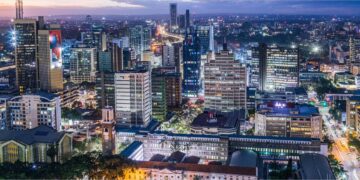South Africa’s Path to Sustainable Economic Revival and Job Creation
In an effort to rejuvenate its faltering economy, South Africa is embracing sustainable development as a cornerstone for generating employment. Government leaders have recently unveiled a multifaceted strategy designed to combat the nation’s persistently high unemployment rate, especially among young people. By cultivating an environment that encourages investment and technological advancement, the administration aims not only to boost economic momentum but also to revitalize communities long affected by economic stagnation. This renewed commitment emerges amid ongoing challenges such as the aftermath of the COVID-19 pandemic and global market volatility, underscoring the urgency for transformative policies that promise inclusive prosperity across all sectors of society.
Comprehensive Government Strategies Targeting Employment Growth
The South African government has intensified its focus on reducing joblessness through targeted programs spanning diverse industries like manufacturing, digital technology, and green energy. Central to this approach are several key initiatives:
- Entrepreneurial Incentives: Tax reliefs and seed funding are being provided to nurture startups and empower small enterprises.
- Collaborative Ventures: Strengthening partnerships between public entities and private companies aims at accelerating investments in vital infrastructure.
- Industry-Specific Skill Development: Tailored training schemes are being rolled out to bridge skill shortages in emerging sectors.
The government is also channeling resources into agriculture and tourism—sectors historically proven as significant employment drivers. Recent projections illustrate their potential impact on job creation alongside planned investments:
| Sector | Estimated Jobs Created | Total Investment (ZAR) |
|---|---|---|
| Agriculture & Agro-processing | 160,000 | ZAR 6 Billion |
| Sustainable Tourism | 210,000 | ZAR 11 Billion |
| Renewable Energy Projects | 120,000 | ZAR 8 Billion |
This sector-focused investment strategy seeks not only immediate reductions in unemployment but also long-term economic resilience by fostering sustainable growth models accessible across social strata.
The Crucial Role of Infrastructure Investment in Economic Expansion and Job Creation
Infrastructure development stands at the forefront of South Africa’s blueprint for revitalizing its economy while simultaneously generating employment opportunities. The government’s commitment encompasses large-scale projects including highway upgrades, railway network expansions, renewable energy installations, water supply improvements, and sanitation system enhancements—all aimed at strengthening foundational services critical for industrial productivity.
Officials highlight how robust transport corridors combined with dependable power sources can attract foreign direct investment (FDI) while empowering local businesses—a dual effect essential for sustained growth.
Key infrastructure priorities include:
- Mega Transport Projects: Enhancing roadways & rail systems facilitates smoother trade flows within domestic markets & export channels.
- Sustainable Energy Initiatives: Scaling up solar & wind power capacity ensures cleaner energy access aligned with climate goals.
- Civic Utilities Modernization: Upgrading water treatment plants & sanitation networks improves public health outcomes supporting workforce productivity.
- Easier Access To Capital: Provisioning grants alongside affordable credit lines helps alleviate liquidity constraints faced by entrepreneurs during expansion phases.
- Bespoke Training Programs:
Initiative Expected Outcome Financial Assistance Expanded capital availability enabling business growth Business Incubators Accelerated innovation cycles leading to new product offerings Networking Forums Strengthened partnerships boosting collaborative ventures A Forward-Looking Perspective: Anticipating Impact on South Africa’s Socio-Economic Landscape
As South Africa intensifies efforts towards sustainable economic expansion backed by strategic sectoral investments—particularly targeting youth unemployment—the ripple effects promise profound transformation across labor markets.
The success metrics will extend beyond immediate job numbers into broader socio-economic indicators such as poverty alleviation rates, equality enhancement, and regional development balance.
Over the next five years, if implemented effectively,&a comprehensive approach combining infrastructure modernization,&a vibrant SME ecosystem,&a diversified industrial base could position South Africa as a resilient model within emerging economies globally.
International observers remain keenly interested in monitoring this trajectory given its implications not just domestically but also within continental frameworks like AfCFTA (African Continental Free Trade Area), which offers expanded trade opportunities aligning well with national ambitions.
In conclusion,
South Africa’s renewed focus on integrating sustainability principles into economic policy signals hope amid adversity—a testament that innovative governance coupled with inclusive strategies can pave pathways toward shared prosperity.
With these efforts projected to create tens of thousands of jobs directly linked to construction phases alone—and many more indirectly through stimulated commerce—the government’s infrastructure agenda represents a pivotal lever driving both short-term recovery & long-term competitiveness.
Nurturing Small Enterprises: A Pillar for Economic Stability and Workforce Empowerment
Recognizing small businesses as vital engines fueling job creation and community upliftment has led South African policymakers toward enhanced support frameworks tailored specifically toward micro-, small-, and medium-sized enterprises (MSMEs).
These ventures form the backbone of local economies by providing diverse employment options while fostering innovation ecosystems crucial during periods of economic uncertainty.
Government-backed measures designed include:















